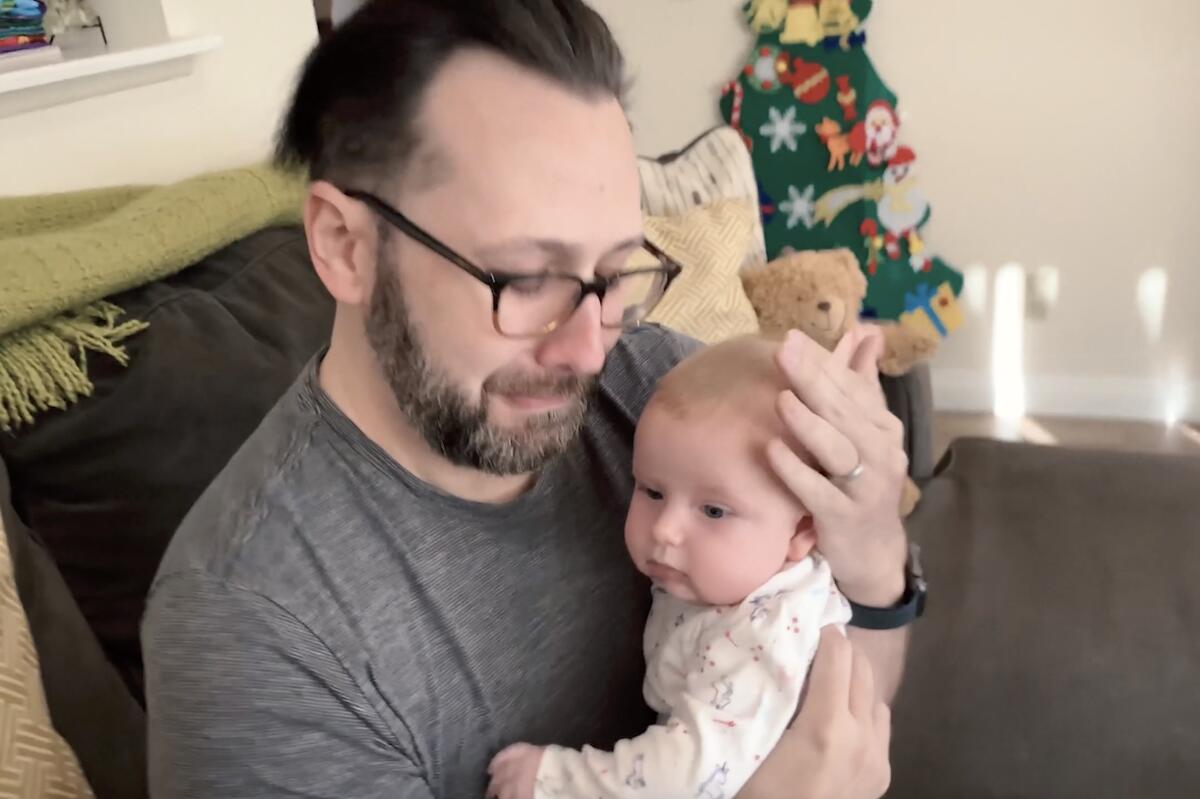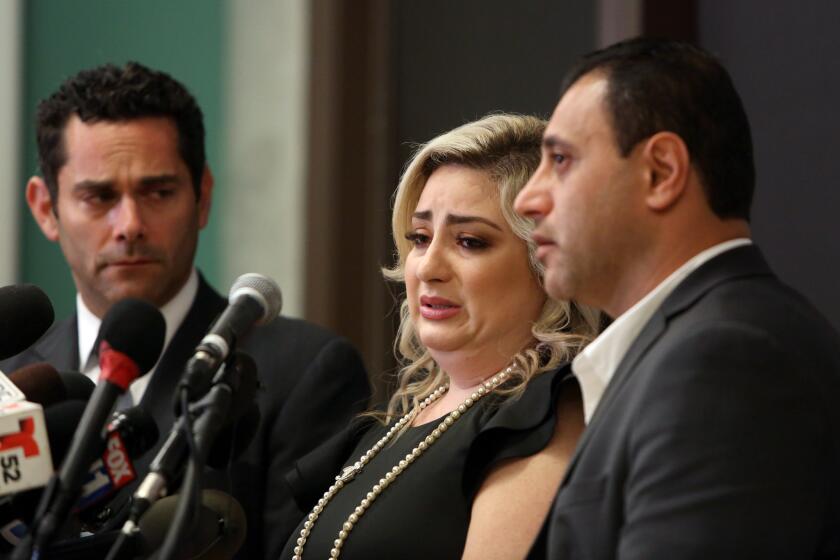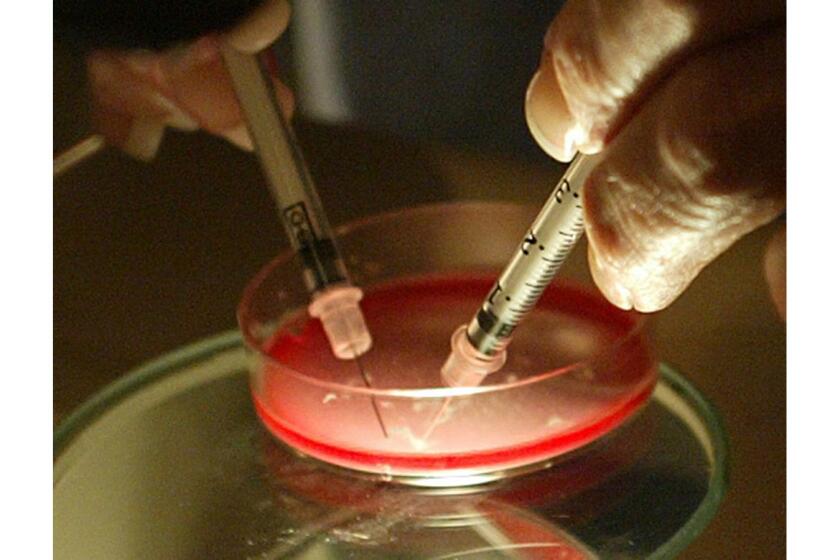‘Nightmare’ IVF mix-up leaves L.A. couple giving birth to other family’s baby

- Share via
When Daphna Cardinale gave birth to her second daughter in September 2019, she and her husband, Alexander, were immediately puzzled by her appearance.
The baby girl, while healthy, didn’t resemble either of her parents and looked to be of a different race. A home DNA test roughly seven weeks later confirmed a nagging worry both hoped could not be true: The child was not related to either of them.
That moment began a troubling, months-long ordeal in which the Cardinales ultimately learned their embryo had been switched with that of another couple during in vitro fertilization. The couples had given birth to — and were unknowingly raising — each other’s babies.
“The heartbreak and confusion cannot be understated,” a teary Daphna Cardinale said during a news conference Monday, shortly after the couple filed a lawsuit against their Los Angeles-based fertility clinic, California Center for Reproductive Health, and its medical director, Dr. Eliran Mor.
Also named in the suit are In VitroTech Labs, a third-party embryology center, and its parent company, Beverly Sunset Surgical Associates, both owned by Mor. The couple are alleging breach of contract, medical malpractice, negligence, infliction of emotional distress and the knowing misuse of their embryo, among other infractions, and are seeking punitive and compensatory damages.
Mor did not immediately respond to requests for comment Monday. His office said he was with patients. A spokesperson at Beverly Sunset declined to comment.
The Glendale couple thought that their in vitro fertilization treatment had failed.
“It was torture that shook me to my core and forever changed who I am,” Daphna Cardinale said. “I was robbed of the ability to carry my own child.”
The mix-up, described in court documents as a “non-stop nightmare,” began after the couple contacted the clinic for help getting pregnant with their second child in 2018. They had conceived their first daughter naturally, but years of trying for another baby had proved unsuccessful.
They sought out Mor and the California Center for Reproductive Health based on positive reviews and the recommendation of a friend, they said.
The clinic transferred the embryo — which the couple believed to be their own — to Daphna Cardinale during an IVF procedure on Jan. 2, 2019, and she became pregnant.
Another couple, identified in the suit only as “Couple Two,” received the Cardinales’ biological embryo around the same time. That child — also a girl — was born exactly one week after the Cardinales’. Additional genetic testing confirmed that each couple had given birth to the other’s baby.
The suit alleges that Mor outsourced the handling of the Cardinales’ embryo to In VitroTech without their knowledge, and despite promising that all work would be done “in house” and under his direct supervision. It was In VitroTech that mixed up the embryos, court documents said.
As a result of the mix-up, the Cardinales said, they didn’t even know someone had given birth to their biological daughter until she was 3 months old.
“We missed an entire year of our daughter’s life,” Daphna Cardinale said. “I didn’t get to experience being pregnant with her or birthing her; we missed her entire newborn period; we never saw our baby’s entrance in the world or cuddled her in her first seconds of life. These are moments that parents are supposed to be able to treasure for the rest of their lives.”
Compounding their distress was the fact that the Cardinales and their older daughter, who was then 5, had already bonded with the child she had carried to term.
“They lovingly raised the child as their own even as they were haunted by doubt,” their attorney, Adam Wolf, said Monday. “The Cardinales, including their older daughter, fell in love with the baby, and they were terrified she would be taken away from them.”
2014 saw the birth of more babies than ever who got their start in the petri dish of a fertility clinic in the United States.
It wasn’t until December 2019 that the two couples finally met. It was the first time either had seen their biological babies.
Over the next few weeks, they met nearly every day. In January 2020, the babies had their first overnight stays with their new families before both couples decided they would stay in their new homes — with their biological parents — for good.
The decision and circumstances created ongoing emotional and psychological turmoil, the Cardinales said, including a sense of guilt and loss over the baby they had “given away.” The mix-up also contributed to career setbacks and a loss of income, they said.
Both couples had to resort to the court system to gain legal custody over their children, Wolf said, and ultimately signed gestational carrier contracts to formalize the exchange.
“Couple Two” will be filing a lawsuit as well, he added, although they wish to keep their identities private.
IVF is an expensive and often arduous process, and Wolf said “fertility disasters” are becoming increasingly common as more families resort to the treatments. His firm has represented “hundreds of people who have been the victims of fertility center misconduct,” he said, including cases of dropped embryos, misplaced embryos and embryos transferred to the wrong person.
In 2019, Wolf represented a Glendale couple whose embryo had been implanted into the wrong woman.
The cases have “life-altering consequences for everybody involved,” he said Monday.
During the news conference, an emotional Alexander Cardinale described feeling shaken after their second daughter was born and he didn’t recognize her.
“Falling in love with our new baby and seeing our family of four come into focus, while at the same time constantly fighting nagging questions and pushing down dark thoughts of doubt — it was truly my hell,” he said.
He hoped that speaking out would help prevent a similar mix-up from happening to other families in the future, he added.
More to Read
Sign up for Essential California
The most important California stories and recommendations in your inbox every morning.
You may occasionally receive promotional content from the Los Angeles Times.













